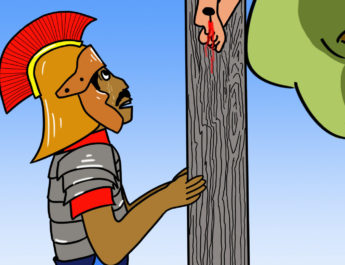Matthew 13:34-35
Narrative Lectionary
A “Jesus” = Iesous. From Hebrew Yehoshua (Joshua, the Lord is salvation); {from YHVH (proper name of the God of Israel; the self-existent and eternal one); {from havah (to become) or from hayah (to come to pass, become, be)} + yasha (to deliver, defend, help, preserve, rescue; properly, to be open, wide or free, which implies being safe. So, in a causative sense, this is to free someone)}. This is Jesus or Joshua in Greek – the Lord saves or the Lord is salvation.
B “told” = laleo. From lalos (talkative). This is to talk, say, or preach.
C “crowds” = ochlos. Perhaps from echo (to have, hold, possess). This is a crowd, the common people, a rabble. Figuratively, it can refer to a riot.
allD these things in parables;E withoutF a parable he told them nothing.
D “all” = pas. This is all or every.
E “parables” = parabole. From paraballo (literally to throw beside, compare, arrive, liken); {from para (by, beside, in the presence of) + ballo (to throw, cast, place, put, drop)}. This is a parable, comparison, adage. Quite often a tale told or a metaphor to establish a point, but it could be a true story.
F “without” = choris. From chora (space, land, region, fields, open area); from chasma (gap, gulf, chasm, open space); from chasko (to gape, yawn). This is apart from, separate from.
35 This was to fulfillG what had been spokenH through the prophet:I, J
G “fulfill” = pleroo. From pleres (to be full, complete, abounding in, occupied with). This is to fill, make full or complete. Properly, this is filling something up to the maximum extent that it can be filled – an appropriate amount for its individual capacity. So, this is used figuratively for furnish, influence, satisfy, finish, preach, perfect, and fulfill.
H “spoken” = ereo. Perhaps from rheo (to say, speak of, command). This is to say, tell, speak, mean, command.
I “prophet” = prophetes. From pro (before, in front of, earlier than) + phemi (to declare, say, use contrasts in speaking to shed light on one point of view); {from phao (to shine) or phaino (to bring light, cause to appear, shine, become visible or clear)}. This is a prophet or poet – one who speaks with inspiration from God.
J {untranslated} = lego. This is to speak, say, name, call, command. It is generally to convey verbally.
“I will openK my mouthL to speak in parables;
I will proclaimM what has been hiddenN since the foundation.”O, P
K “open” = anoigo. From ana (up, back, again, among, between, anew) + oigo (to open). This is to open in literal or figurative sense.
L “mouth” = stoma. Perhaps from tomoteros (sharp, keener); from temno (to cut). This is mouth, speech, language, the tip of a sword, an opening in the ground.
M “proclaim” = ereugomai. 1x in NT. This is to burp out, spit, utter, declare.
N “hidden” = krupto. 18x in NT. This is to hide by covering, secret, hidden things. This is the root of the word “cryptography.”
O “foundation” = katabole. Related to “parables” in v34. 11x in NT. From kataballo (to cast down, lay prostate, set a foundation); {from kata (down, against, throughout, among) + ballo (see note E above)}. This is a foundation or a plan for one – setting the foundation according to the plans. Figuratively, it can be the beginning of something, sowing, or conception.
P {untranslated} = kosmos. Some manuscripts add “of the world.” Perhaps from the base of komizo (to carry, convey, recover); from komeo (to take care of). This is order, the world, the universe, including its inhabitants. Literally, this is something that is ordered so it can refer to all creation. It can also refer to decoration in the sense that something is better ordered and, thus, made more beautiful. This is where “cosmos” and “cosmetics” come from.
Image credit: “Jesus Heals a Man with Leprosy” by Bible Society Australia – The Wild Bible




